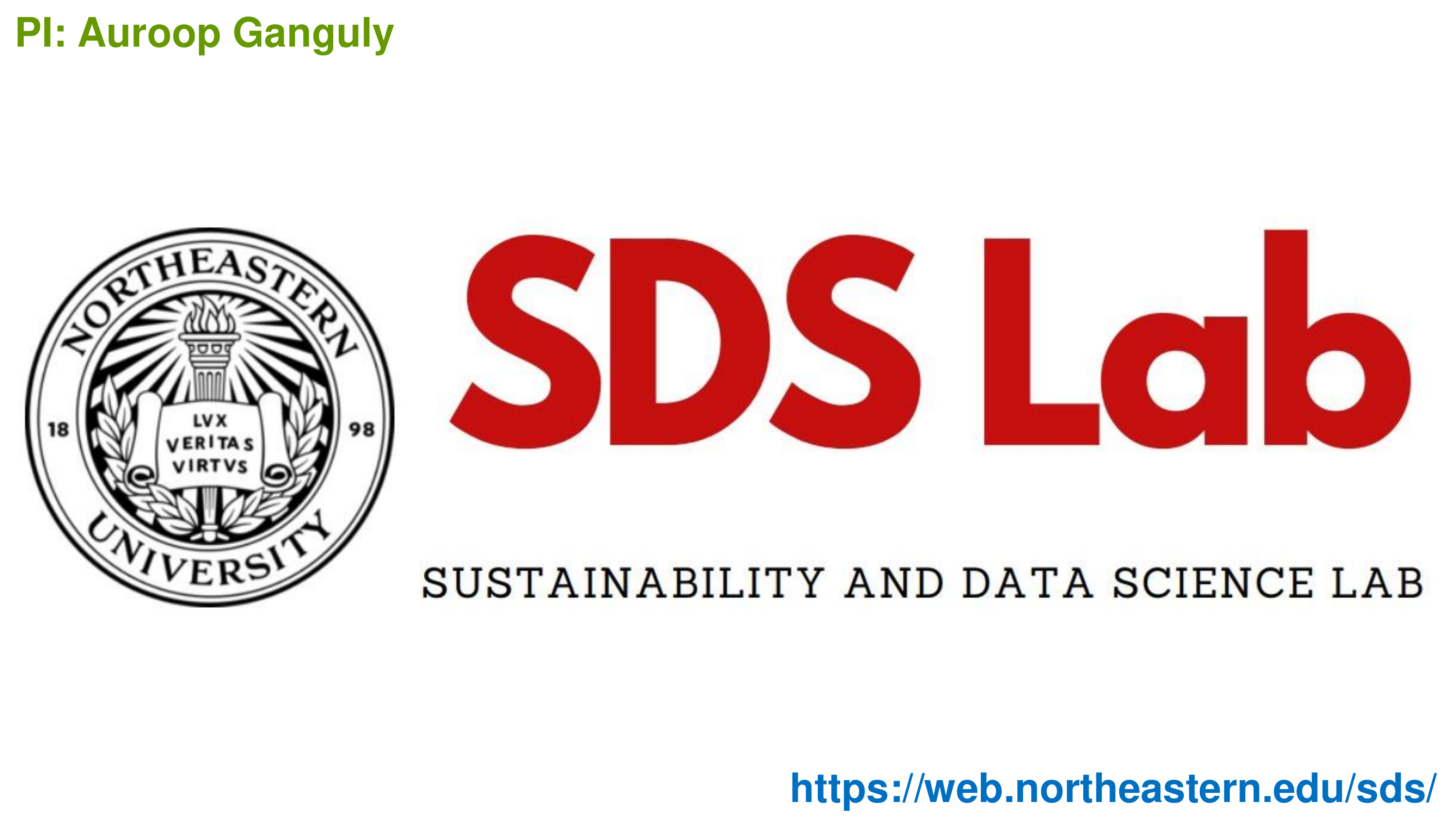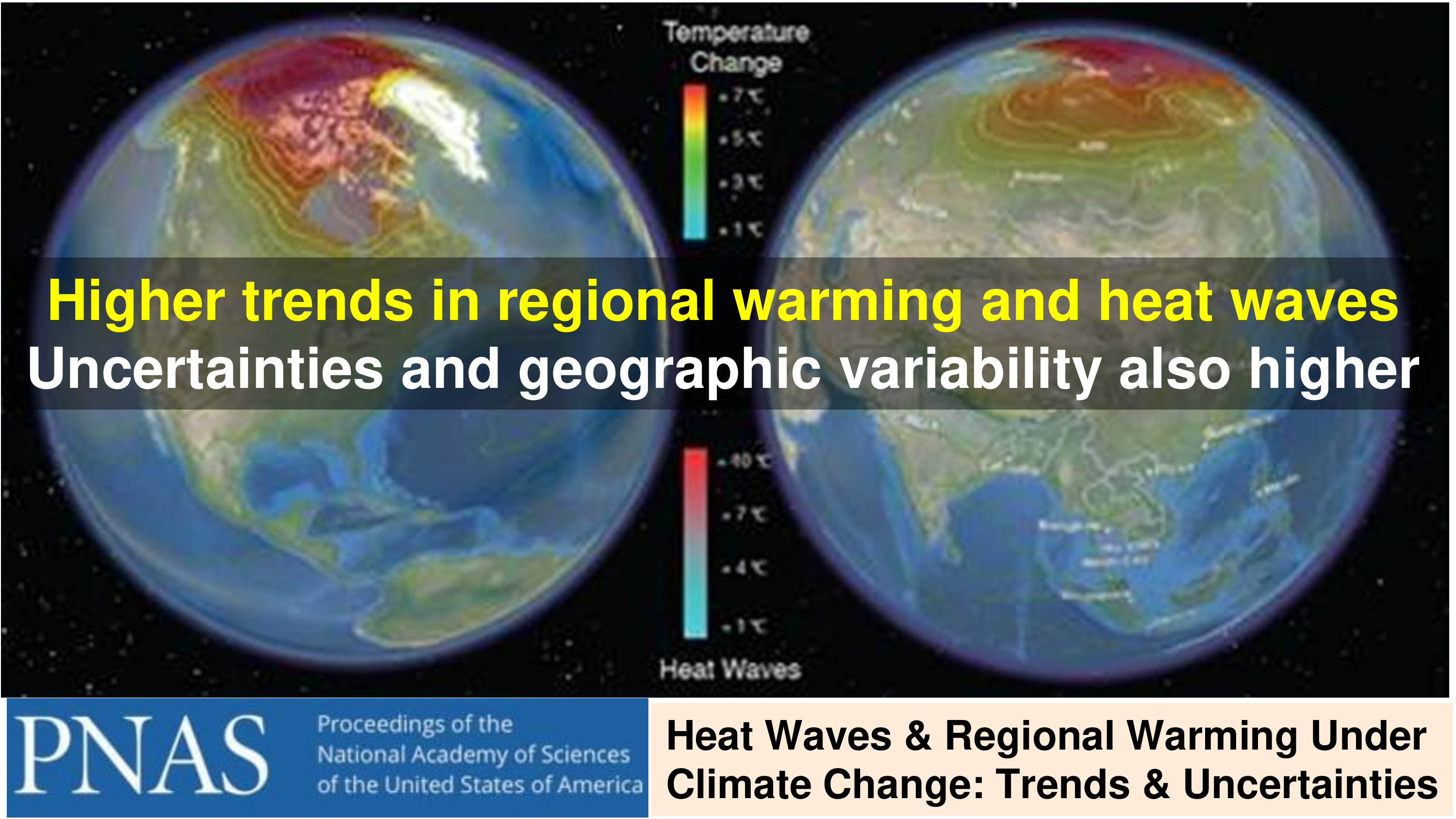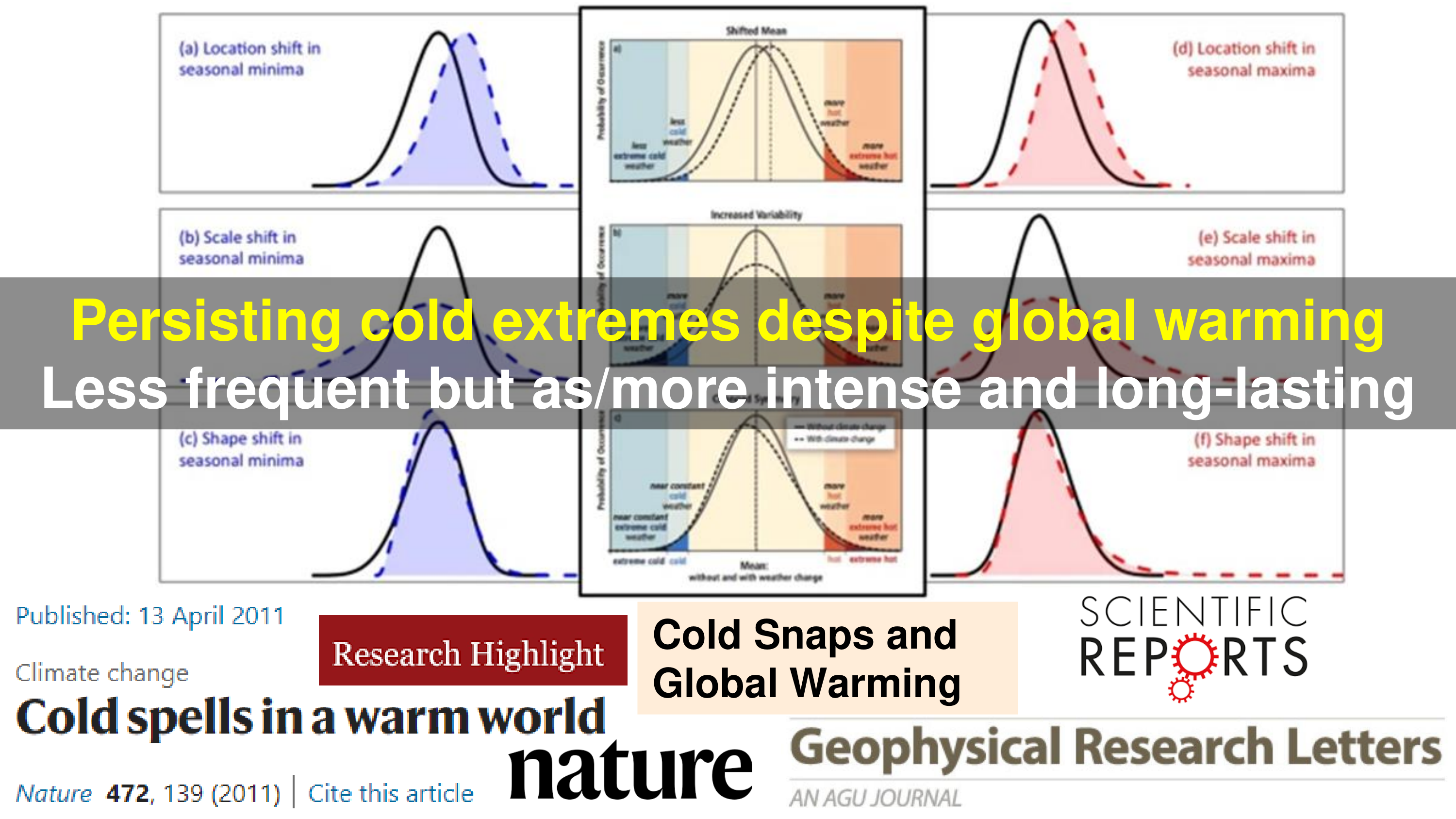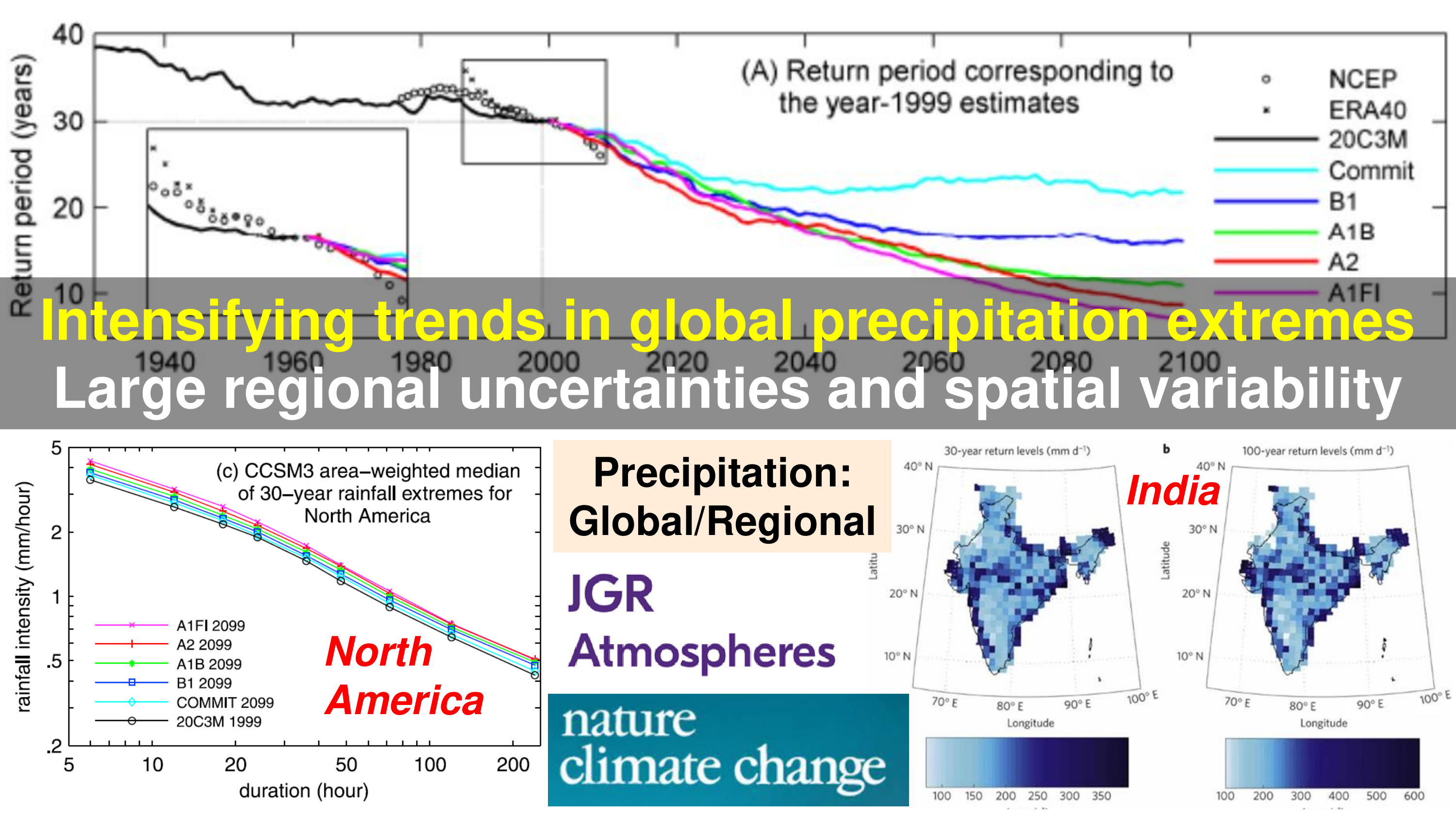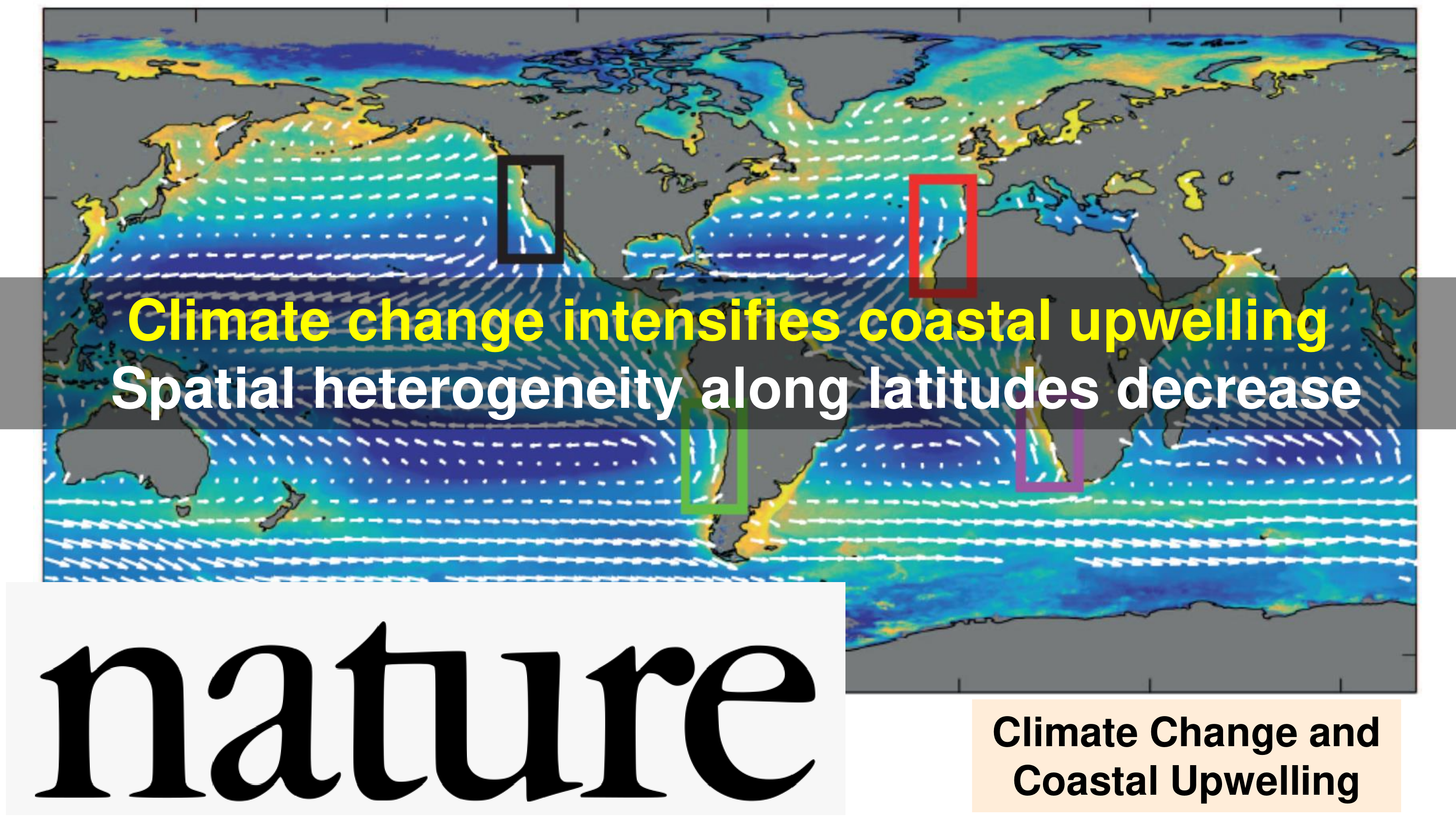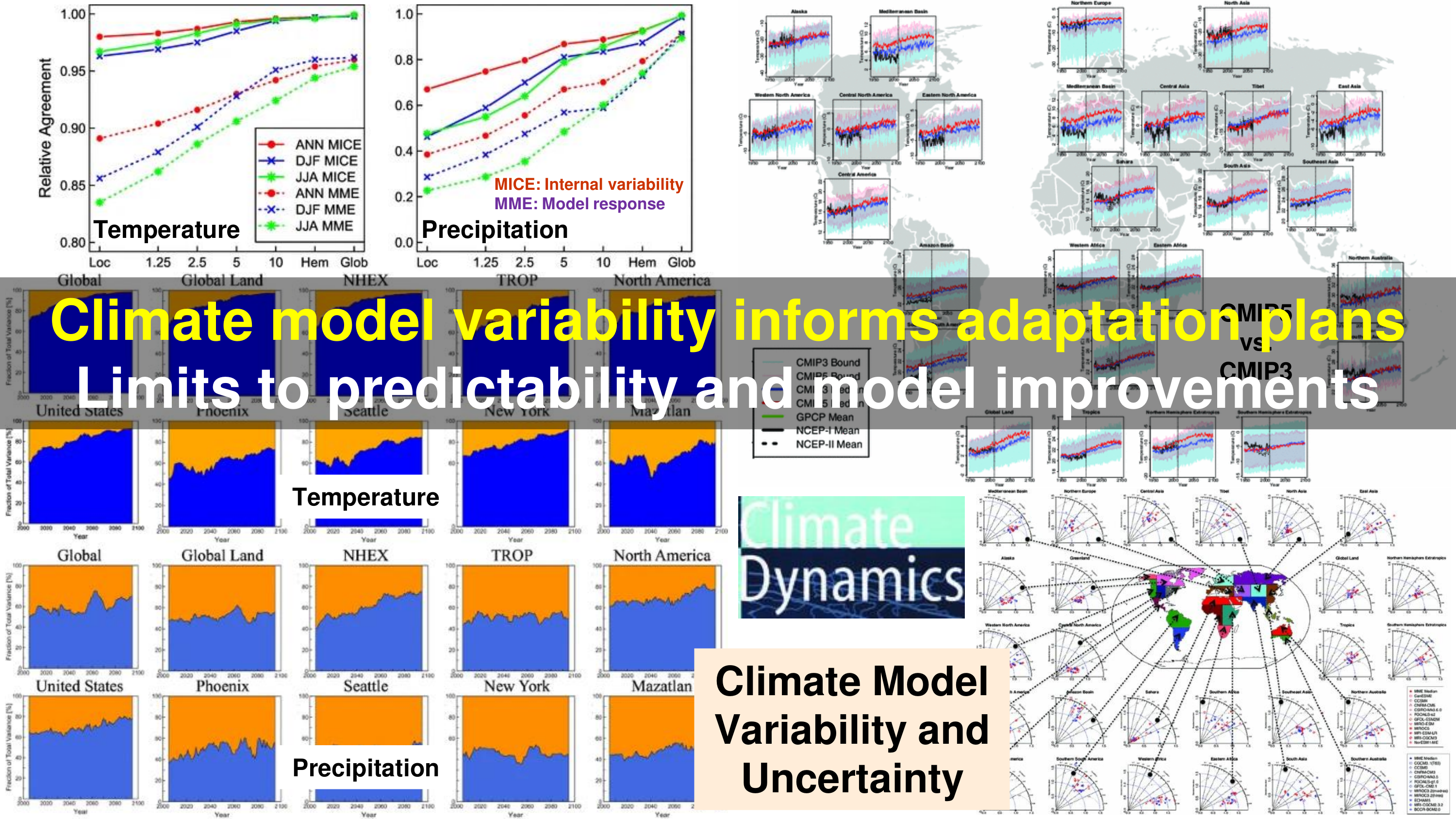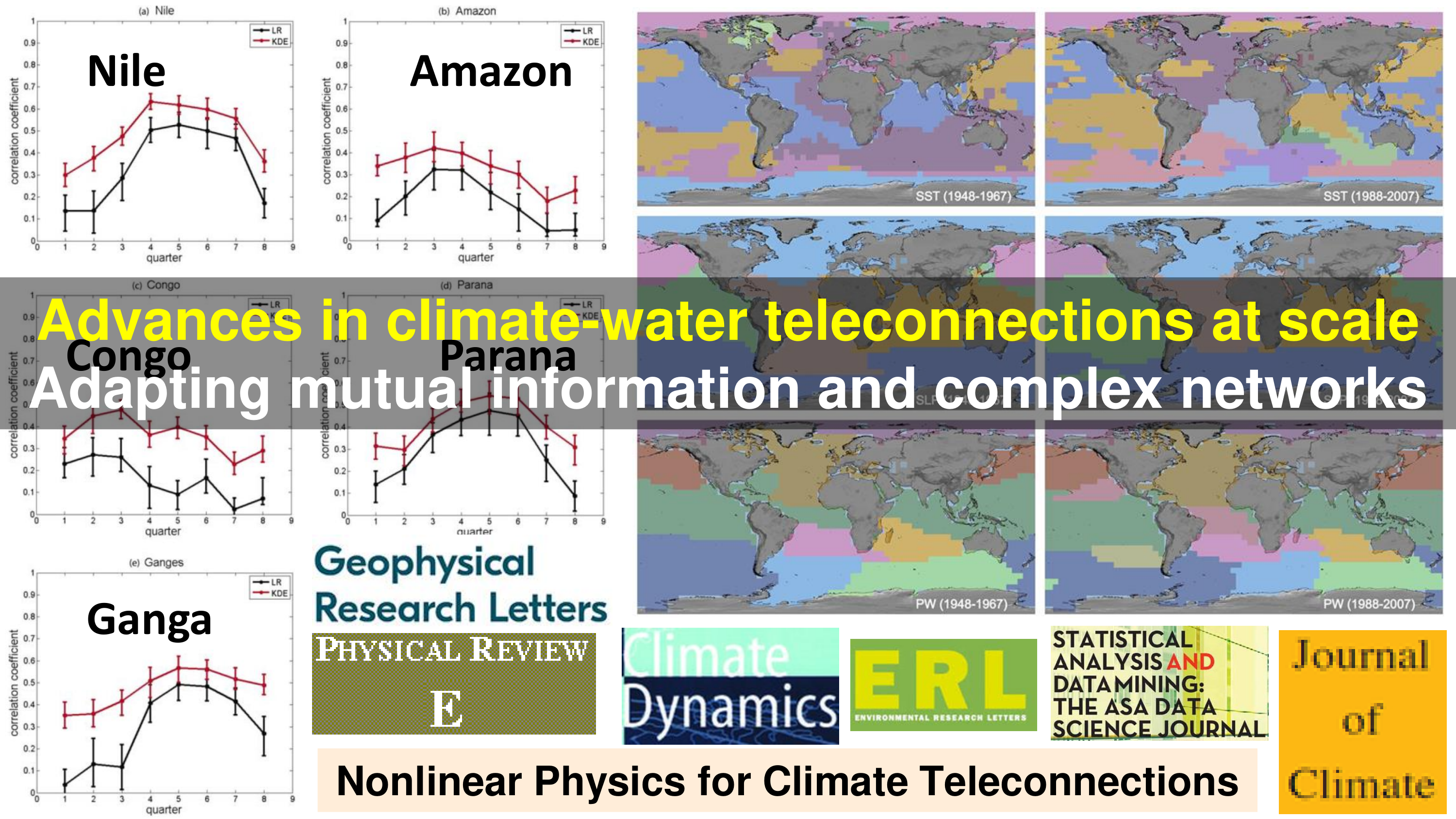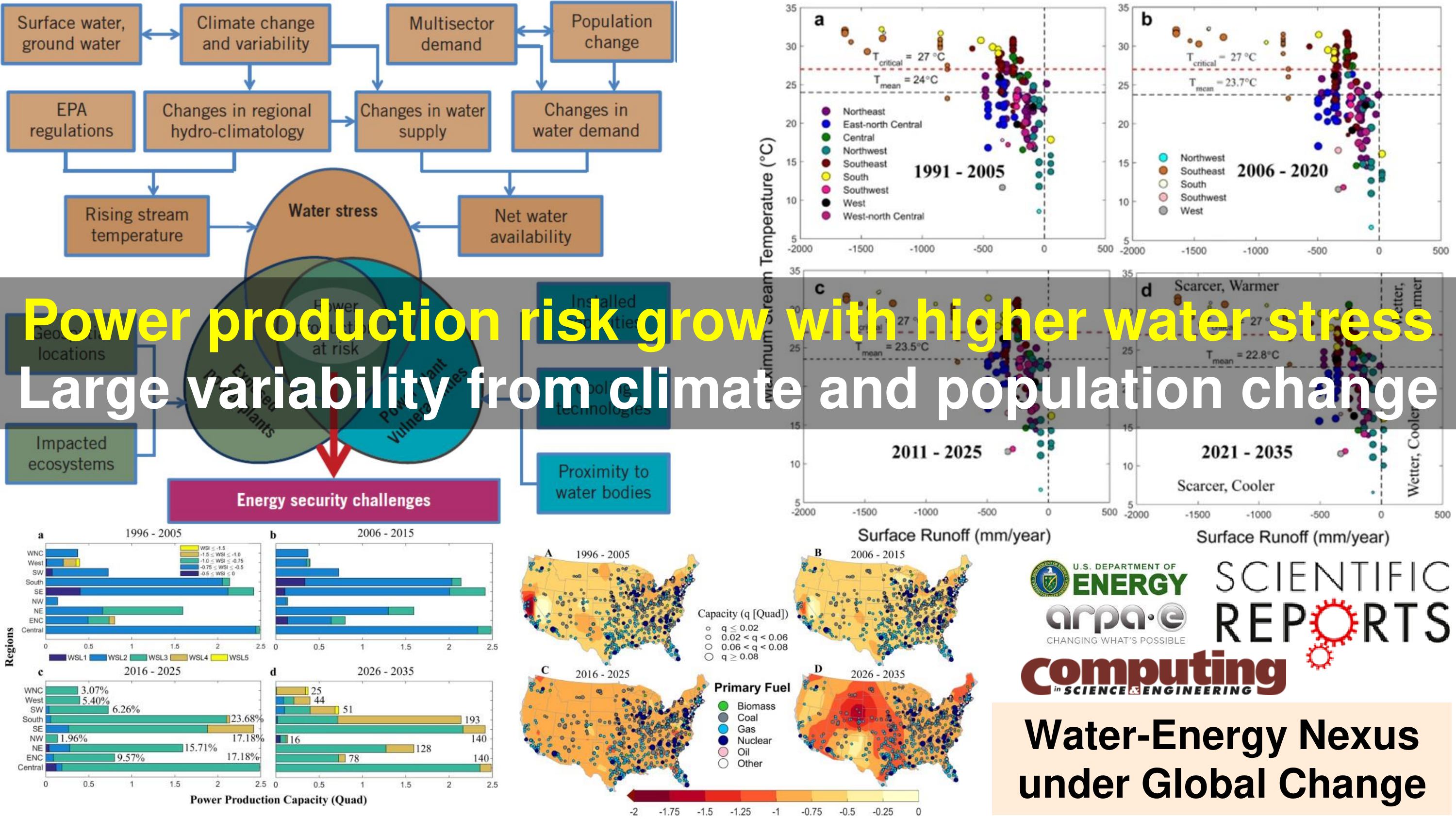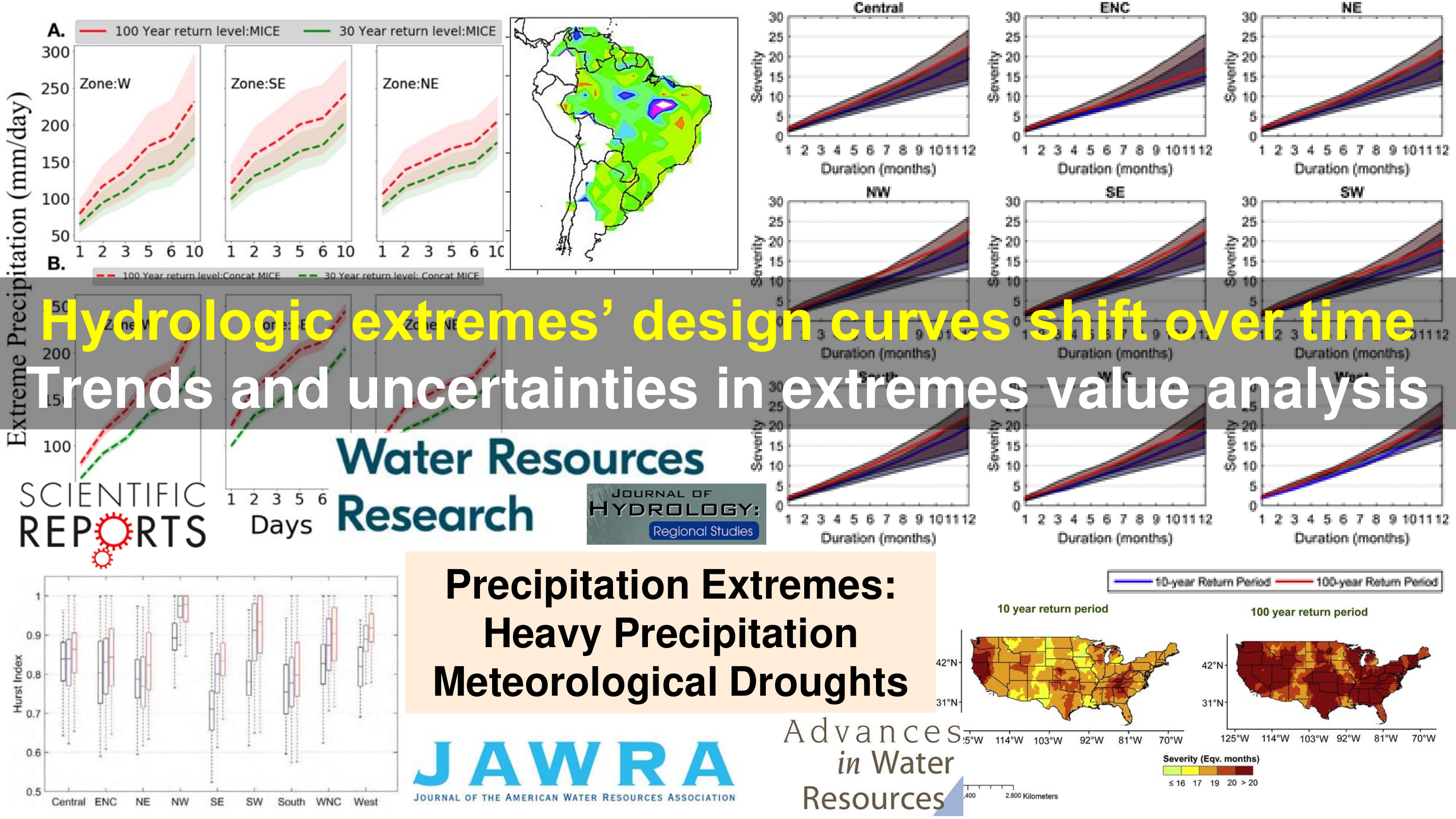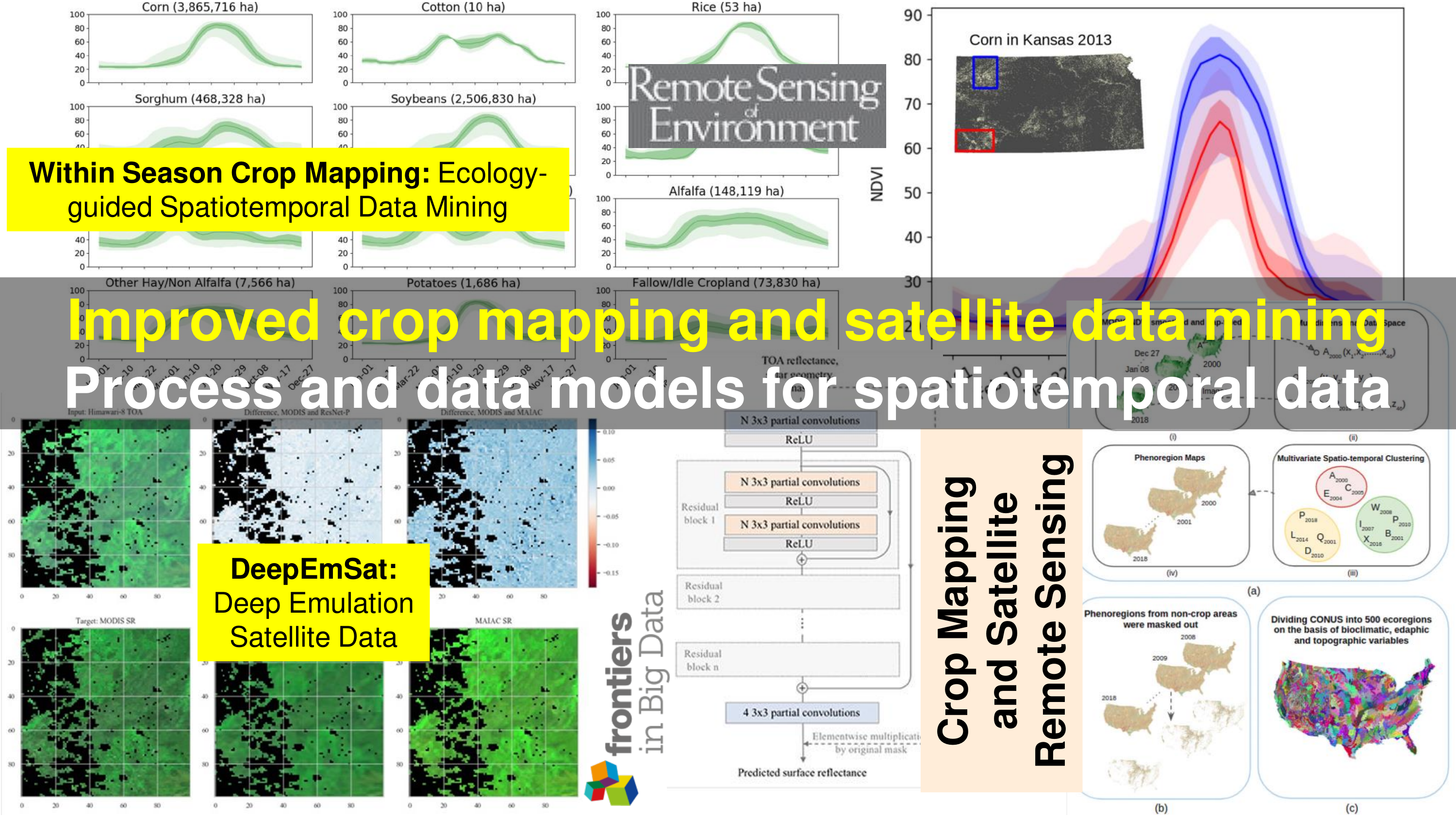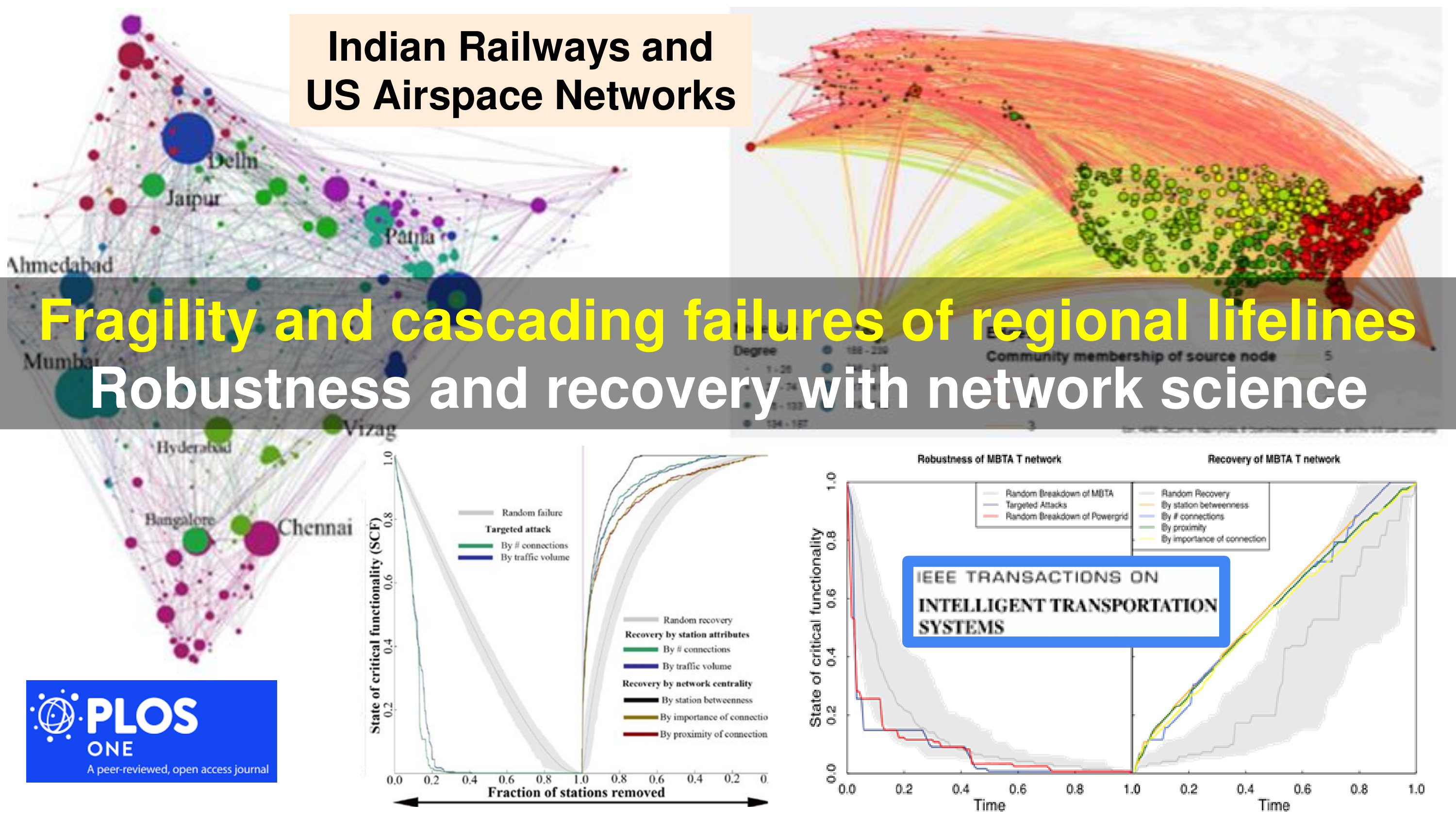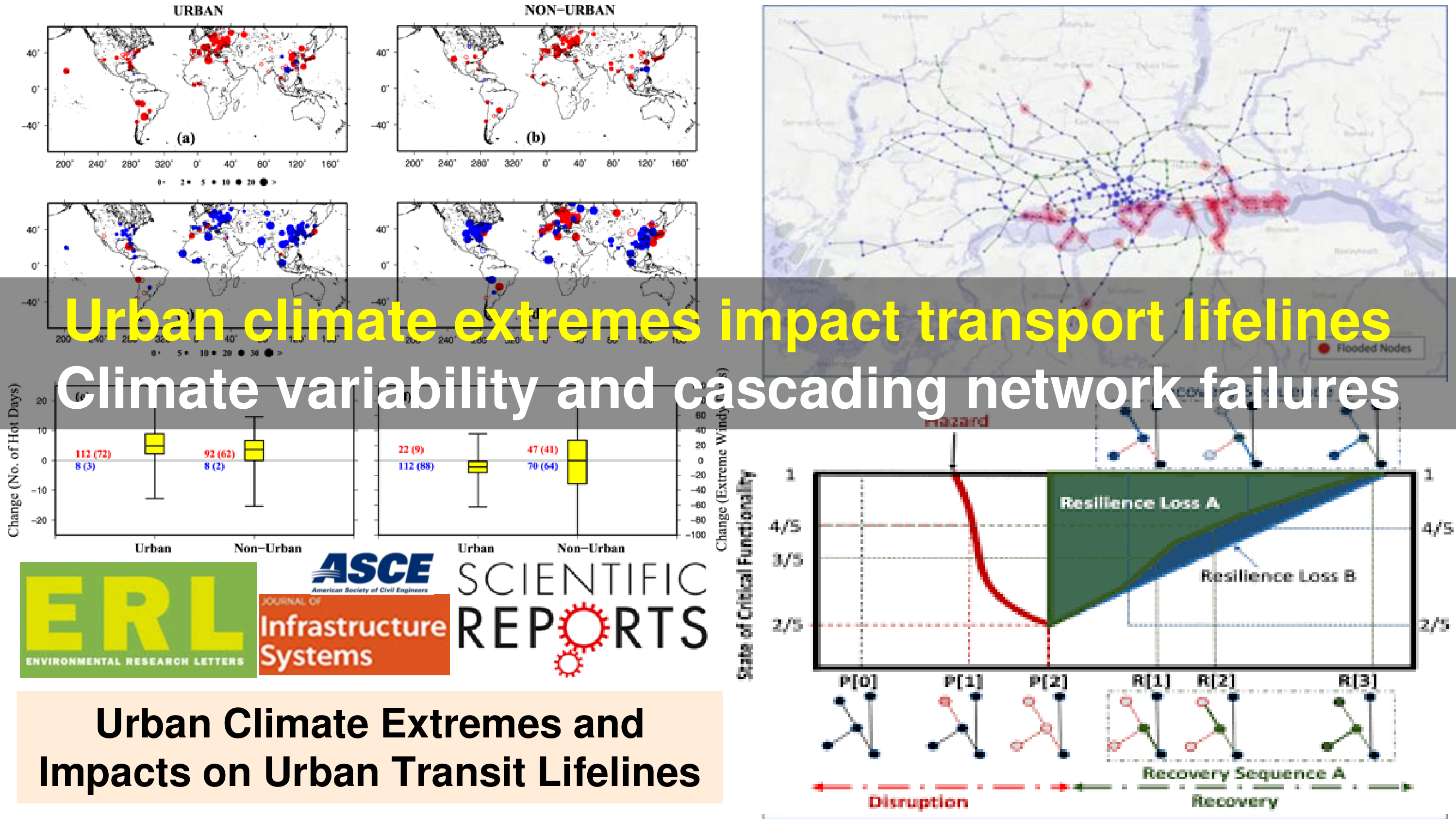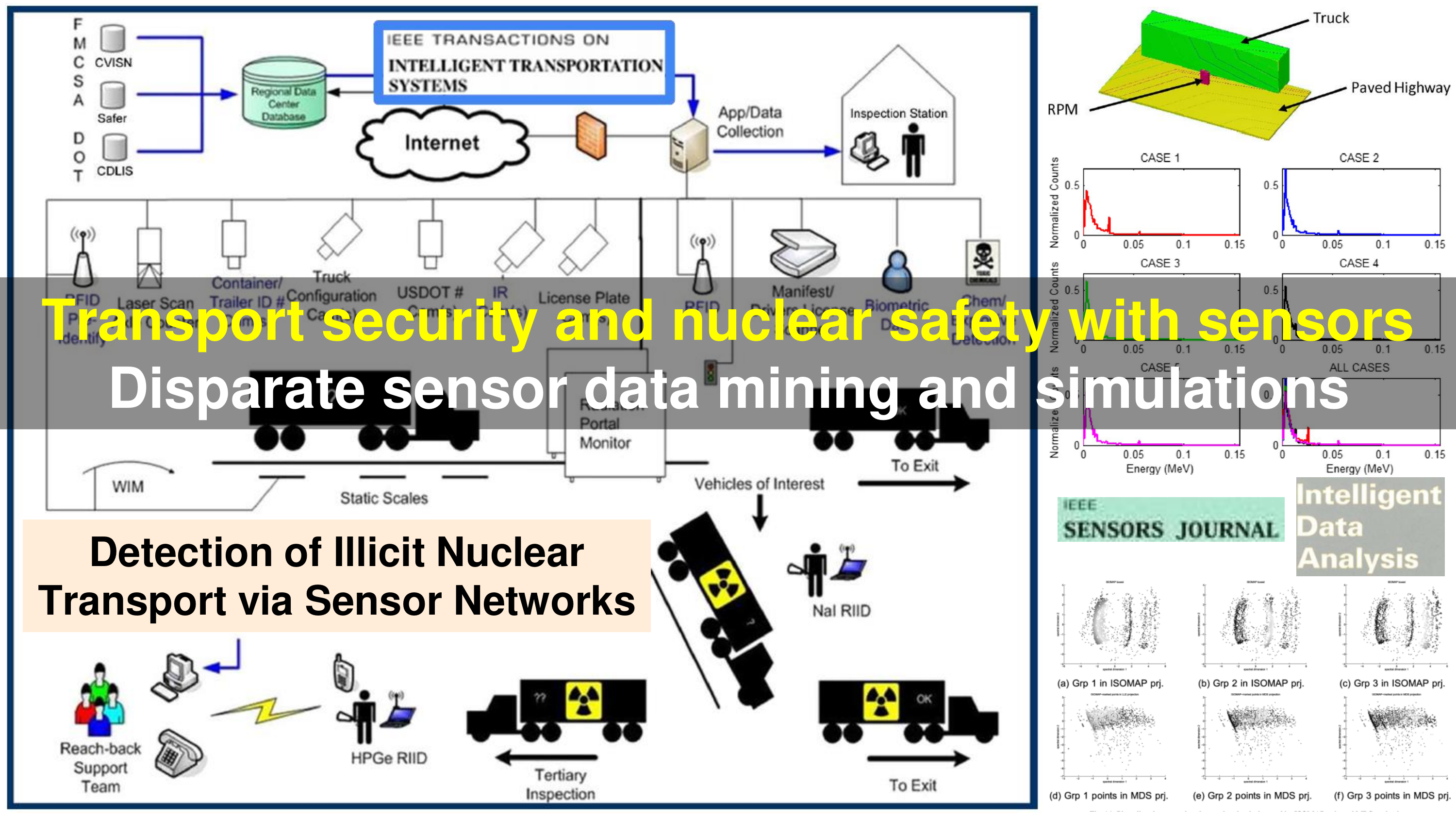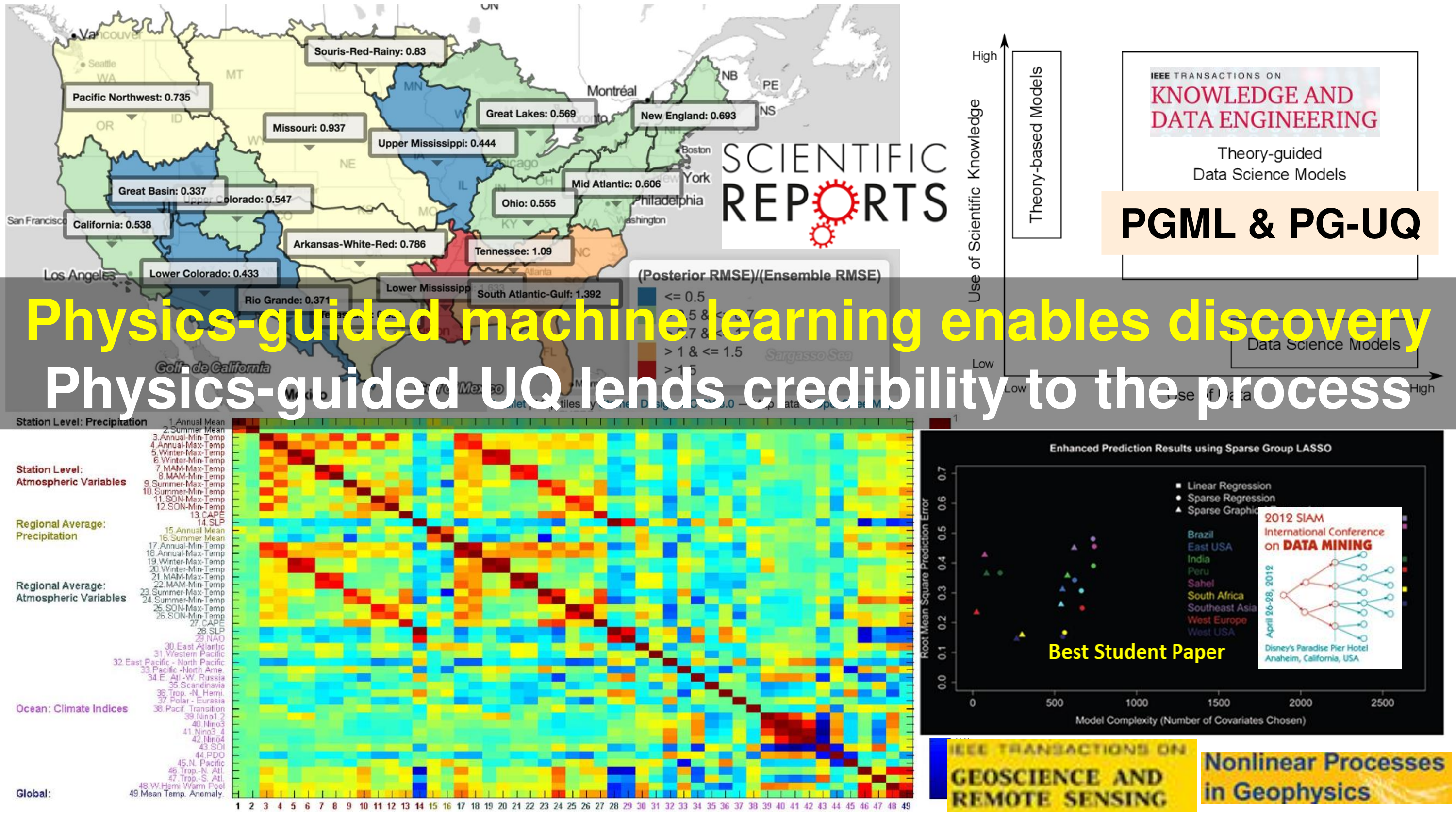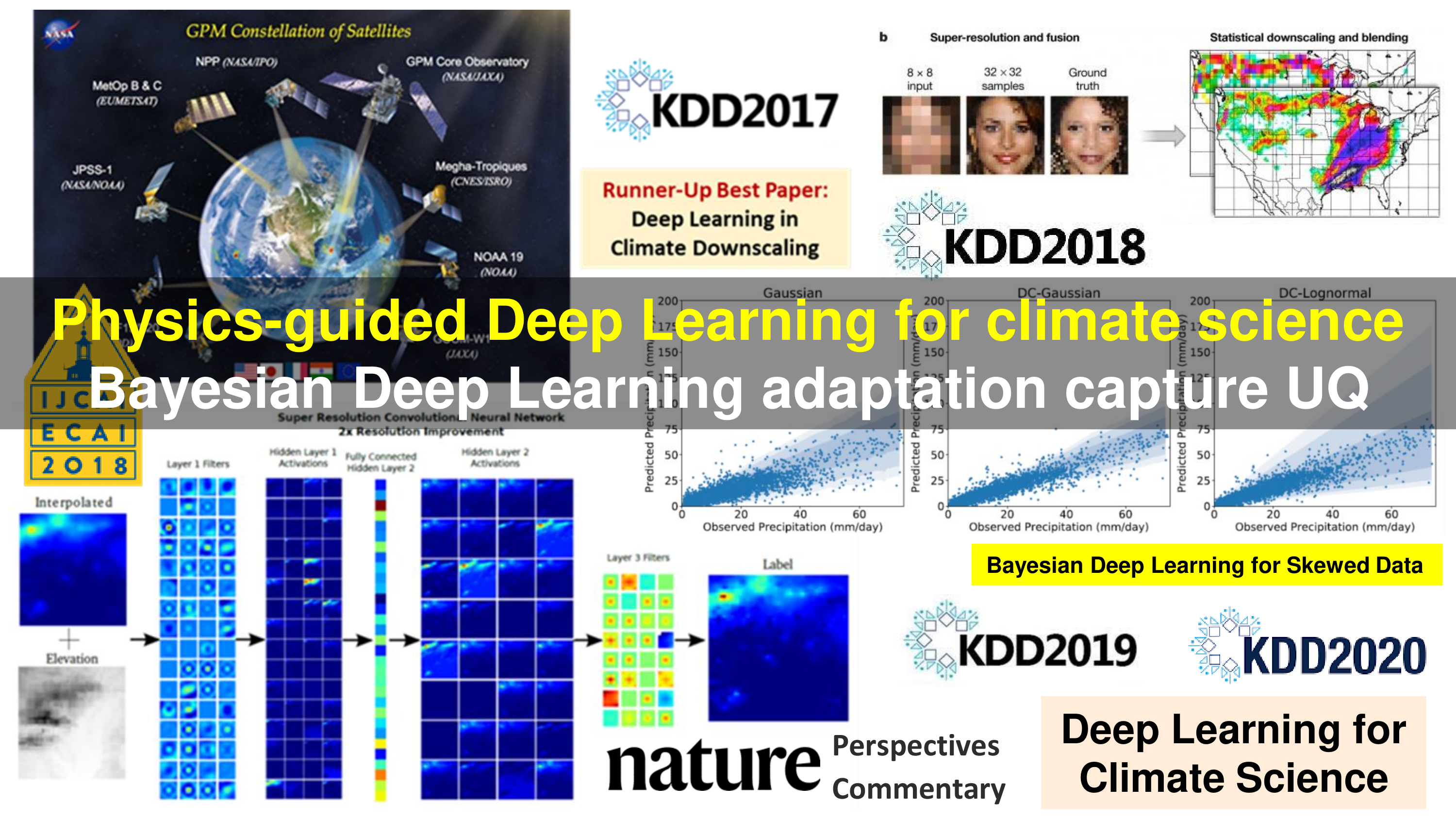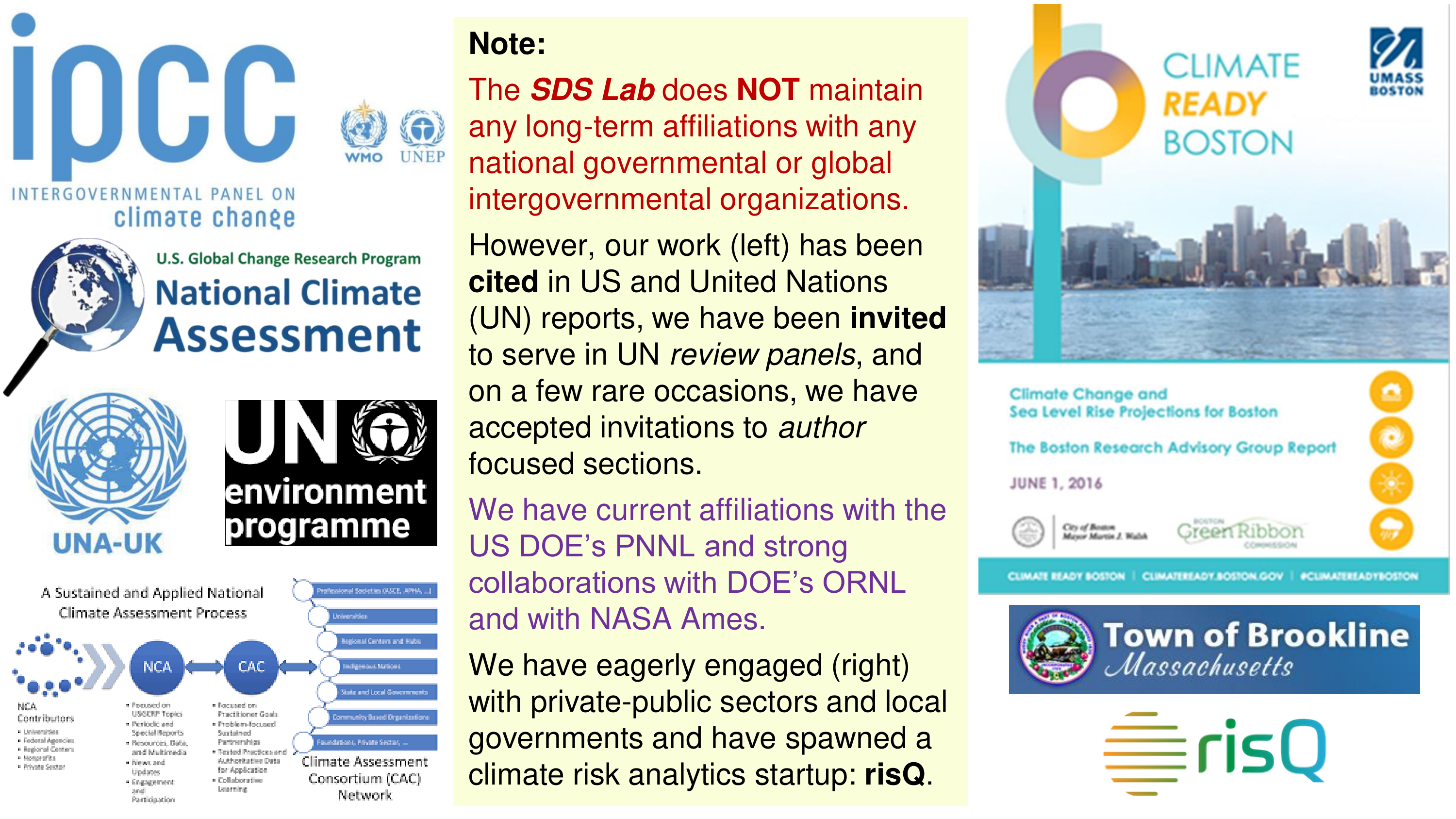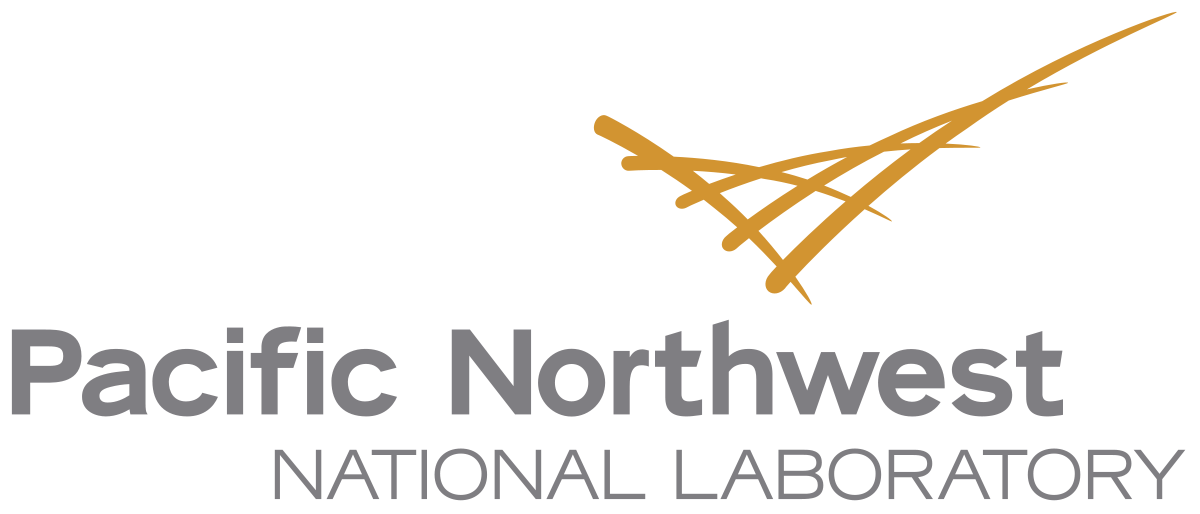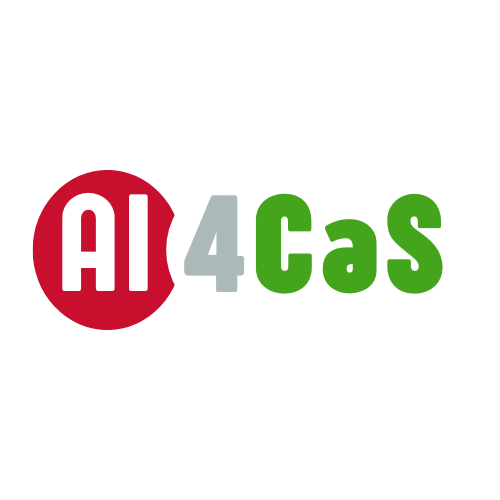The Sustainability and Data Sciences Laboratory (SDS Lab) develops novel insights in the interdisciplinary sciences of climate extremes and the engineering principles of networked lifelines to inform adaptation and policy. Physics-integrated spatiotemporal machine learning and nonlinear dynamics, especially from large-scale numerical model-simulations and remote or in-situ sensor data, enable the discovery of new insights in climate extremes and uncertainty, while network sciences and optimization along with engineering or ecological principles aid in understanding infrastructural or ecosystem vulnerability. Decision sciences and policy imperatives are integrated in the scientific discovery and technological invention processes to embed stakeholder perspectives.
The PI of SDS lab is Dr. Auroop Ganguly (Distinguished College of Engineering Professor, Director of the SDS Lab: Sustainability and Data Sciences Laboratory, and Director of AI4CaS: AI for Climate and Sustainability, Northeastern University, Boston, MA)
See our (Publications and Patents here) !
The research vision and thrust of the SDS Lab is captured through recent presentations (listed in chronological order) by the PI Auroop Ganguly: A 2019 US National Academy of Sciences (NAS) workshop on urban sustainability (Ganguly's keynote is here), a collaborative presentation in 2021 on infrastructure and installation resilience subject to compound extremes (here), a NAS workshop on AI/ML for earth systems in early 2022 (Ganguly's short panel presentation is here), and a couple of presentations on climate science and adaptation engineering in late 2022, specifically, an invited talk at SC22 (here) and an invited plenary talk at TIES 2022 (here). Our research (see Scholar profile) has been published in interdisciplinary climate journals such as Nature, Nature Climate Change, and PNAS, won best paper awards in highly selective AI/ML conferences such as ACM KDD, and appeared across disciplinary journals in climate, water, infrastructures, remote sensing, data science, machine learning, and nonlinear dynamics. The SDS Lab connects strongly with two institutes within Northeastern University (NU), specifically, the Global Resilience Institute (GRI) and the Institute for Experiential Artificial Intelligence (EAI), in addition to two institutes directly connected with NU, specifically, the Roux Institute and the Kostas Research Institute (KRI). Our education and workforce development mission includes spawning entrepreneurial activities in the private sector (example here) and the public sectors (examples here and there), teaching climate science, engineering adaptation, and policy to undergraduates, both as on-campus and study abroad (see here) courses, each with different flavors, as well as teaching graduate courses on climate science and engineering, time series and geospatial data sciences, and critical infrastructures resilience (see our CIR textbook here). Our recent media highlights include articles in Newsweek, the New York Times, the Independent, and the Wall Street Journal, as well as a NASA feature, a PNNL spotlight, and an NU news, while previous highlights have appeared in the journal Nature, NSF news, and the Boston Globe, among many others. The SDS Lab, supported by the Civil and Environmental Engineering department at Northeastern University in Boston, MA, USA, is physically located right across the heart of the city across the Reflection Pool near the Prudential.
Product Development: The SDS Lab prides itself on the products, ranging from climate science discovery and novel engineering principles to peer-reviewed papers in top journals and highly selective conferences, as well as patents, text and edited books and chapters, besides connections with the private and public sectors, national laboratories and federal research organizations such as US DOE’s PNNL and ORNL and NASA Ames, along with local and city governments. The SDS Lab and its prior incarnation at ORNL has authored 65 peer-reviewed journal articles with 5 more in review, 7 highly-selective and 41 selective peer-reviewed conference papers for a total of 136 conference presentations, 3 books and 24 book chapters, 11 technical notes and delivered 96 invited talks. The SDS Lab has developed 2 US patents, one in climate risk and one in infrastructure resilience, 3 invention disclosures, and spawned a climate analytics startup called risQ. The SDS Lab PI (Auroop Ganguly), with his students, postdocs and visiting professors, have published in top disciplinary and interdisciplinary venues in climate science (such as Nature, PNAS, and Nature Climate Change), lifeline engineering (e.g., IEEE Transactions and ASCE) and data science (e.g., KDD and IJCAI) with best paper awards in ACM KDD and SIAM Data Mining as well as best poster awards at AGU and AMS, leading to citations in the United Nations intergovernmental and United States national reports, highlights in scientific venues such as the journal Nature and in the National Science Foundation media, invitations at UN panels and as author or co-author of focused sections, as well as quotes and citations in the national and global media. The SDS Lab does not have any long-standing connections or commitments to governmental or intergovernmental bodies of national or global bodies but has cultivated relations with private-public-government research and practice communities.
Workforce Contributions: Northeastern SDS Lab (and prior incarnation at ORNL) alums and research mentees of the SDS Lab PI have assumed key research and leadership roles in the private sector, government research institutes, and in academia. Our graduate and postgraduate alums are in US federal agencies such as NASA and in US national laboratories such as DOE’s ORNL and DOT’s VOLPE, as well as in niche and leadership roles in the US private sector in areas such as machine learning, risk modeling and engineering. One PhD alum is the co-founder and CEO of a growing climate analytics startup, while several other PhD or postgraduate as well as visiting faculty alums are in the US and Indian academia include award-winning professors at multiple campuses of the Indian Institute of Technology. Our undergraduate alums are spread across the private and public sectors and have been accepted in top graduate programs in the US, including MIT, Stanford, Berkeley and in rare occasions absorbed within Northeastern. A few of our graduate alums have chosen to join the finance and insurance sector.
Entrepreneurial Activities: The SDS Lab defines entrepreneurial activities as socially impactful private sector startup companies, translational R&D activities such as patents, as well as direct work with communities. The two US patents granted to the SDS Lab include one on climate risks and the other on infrastructural resilience. SDS Lab alumnus Dr. Evan Kodra (PhD ‘2014) and SDS Lab PI Auroop Ganguly along with NU graduate Colin Sullivan co-founded a startup called risQ in urban climate analytics with monetization pathways through the Muni bond markets. The startup company, originally launched with NSF SBIR grant funding and boosted by paying customers, has since been successfully acquired by the Fortune 500 company Intercontinental Exchange (ICE), which in turn counts the New York stock exchange as a subsidiary. The news of the acquisition was dissemination by Northeastern University news (see here) and reported in the Wall Street Journal (see there), among others. SDS Lab alums Thomas J. (“TJ”) Vandal (PhD ‘2018) and Kate Duffy (PhD ‘2021) are the co-founders of an AI-based weather prediction company called Zeus AI catering to the renewable energy markets such as companies in the wind and solar verticals. Vandal and Duffy were NASA scientists following their PhDs and launched their startup with NASA SBIR grant funding, as reported in Northeastern Global News (see here). Kodra and Ganguly are advisors at Zeus AI. The SDS Lab has been engaged with communities, such as with Climate Ready Boston (e.g., the BRAG report) and Greater Boston (e.g., the G-BRAG report), as well as with the Town of Brookline, MA (e.g., see the AGU TEX website and the award-winning AGU virtual poster). The communities can be urban or rural, as well as national (e.g., SCAN: scroll down to see news articles and click here to view the History of SCAN) as well as global (e.g., see Northeastern news about SDS Lab’s visit to the United Nations and the PI Ganguly’s engagement with a United Nations panel). As Co-Director of Northeastern University’s Global Resilience Institute (GRI) and Director of the Artificial Intelligence for Climate and Sustainability (AI4CaS) focus area with the Institute for Experiential Artificial Intelligence (EAI) at Northeastern University, Ganguly hopes to further develop entrepreneurial activities.
Experiential Learning: The SDS Lab PI Auroop Ganguly teaches three courses on campus and two courses via study-abroad programs at Northeastern University, all five of which he designed and developed himself. The on-campus courses are: CIVE 5363: Climate Science, Engineering Adaptation, and Policy (4 credits, UG and Grad); CIVE 7100: Time Series and Geospatial Data Sciences (4 credits, Grad); and CIVE 7110: Critical Infrastructure Resilience. The course CIVE 7110 was co-taught to both engineering and policy students and led to the development of a textbook by Taylor & Francis. The two study-abroad courses, offered through the Northeastern University Dialogue of Civilizations program, are the following (4 credits each): CIVE 4777 (UG) [or CIVE 6777 (Grad) or HONR 3309-A (UG Honors)]: Climate Hazards and Resilient Cities Abroad and CIVE 4778 (UG) [or CIVE 6778 (Grad) or HONR 3309-B (UG Honors)]: Climate Adaptation and Policy Abroad. The Dialogue programs focus on Climate and Emerging Economies, and as explained to the University Alumni Network (see here), has attracted all students from all colleges at Northeastern over the years (since it was first offered in 2014) and has visited the following locations: India in 2014, 2015, and 2016, Singapore and Indonesia (Jakarta and Bali) in 2017, Brazil and Peru in 2018 (part a and part b), Nepal and India in 2019, went virtual in 2020 owing to the pandemic, restarted with Tanzania in 2022, and plan to visit Nepal and India in 2023, and Singapore, Cambodia, and Indonesia in 2024.
Funding Grants: The SDS Lab has been and continues to be generously funded by US federal agencies such as NSF, DOD, NASA, DHS, DOE and DOE Labs. Occasional funding and in-kind support have been received from the private and public sectors. During the last 17 years as an independent researcher, first at US DOE’s Oak Ridge National Laboratory and now at Northeastern University, the total dollar value of the grants in which the PI Auroop Ganguly has taken part or continues to take part is of the order of US $65 Million. The PI has prior background in the private industry, including Oracle Corporation and a best-of-breed company called Demantra Inc. that was acquired by Oracle, and has co-founded two startups including risQ. The PI is currently a joint scientist at US DOE’s Pacific Northwest National Laboratory and the Chief Scientific Adviser at risQ. The students and postdocs, as well as visiting faculty, at the SDS Lab benefit from our strong experiential relationships with federal agencies such as NASA Ames and DOE Labs such as PNNL and ORNL, as well as the private and public sectors including the Lab spinout startup risQ.
External Collaborators:
SDS Lab Startups:
Internal Collaborators:
Funding Sources:






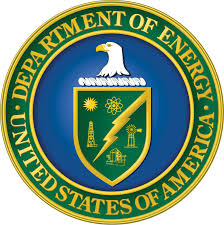



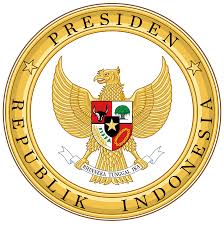




and Private Donors
News
August, 2025
Over the last six months, the SDS Lab researchers have published in Nature Partner Journals (npj), specifically, npj Complexity (on network science as a tool for delineation of large ensemble of earth system models) and npj Climate and Atmospheric Science (on evaluation and uncertainty of earth system multimodel ensembles), as well as in Physical Review E (a nonlinear physics journal on a new methods for resampling based causal analysis), a (a workshop summary) in the Association for Computing Machinery (ACM) SIGKDD Proceedings (an AI and the top data mining conference), and a review paper on nonlinear dynamics methods for complexity in the earth sciences in an npj journal (just accepted). The SDS Lab PI (Ganguly: NU, PNNL, Wikipedia) has been quoted in an editorial news article of Science magazine (on urban climate projections), in Medium (on systematic evaluation of earth system models) and in an editorial in the Manila Times (on global weirding: see also, for context, here, there, and yonder), delivered invited talks at Harvard University (on data-driven controversies), the KDD 2025 Fragile Earth Workshop (on physics-integrated AI for the earth sciences), and the Toronto Public Library (on AI for climate; key: mYUsaM2i), as well as interviews on an Agents of Tech WebsEdge Podcast (on the potential and pitfalls of AI) and Radio Polar in Magallanes Chile (regarding our study-abroad program: climate, weather, and emerging economies). Meanwhile, the AI4CaS focus area of the Institute for Experiential AI and the Roux Institute, along with the SDS Lab, received a new ~$1 Million funding from the Air Force Weather (WEAVE: Weather Ensemble Analysis and Visualization Environment) while continuing on existing funded projects such as the 5-year, ~$3M DOD SERDP (NICE: Networks Infrastructure under Compound Extremes), NASA Water Resources (RAIN: Remote-sensing data driven Artificial Intelligence based precipitation-Nowcasting), two Small Business Innovation Research (SBIR) projects funded by the US DOE, a project funded by the Indian Monsoon Mission, research funded by the government of Indonesia, and a donor-funded research. The work by the SDS Lab also informed a US Congressional testimony related to the 10-year, ~$36 Million center on soft target threat deterrence. The four startups launched by former SDS Lab PhD students are all thriving: the former startup risQ (also, see here) currently as ICE Climate (where this ICE stands for Intercontinental Exchange, the Fortune 500 company that owns the New York Stock Exchange) post their successful acquisition, the current startup Zeus AI (on weather and AI: for context, see here) that has been thriving over the last few years, and two recent startups (which received new funding recently): AIResQ (on AI based flood prediction and resilience) and Enodia (on infrastructure resilience, partly based on a pending US patent by the SDS Lab, which is our third submission following two previous successful US patents). The PI gave invited multiple talks at multiple reputed universities in the US, and in Chile, Argentina, and India, gave invited talks (or recently got invited for them) at workshops or sessions of the American Society for Civil Engineers, American Geophysical Union, and the American Meteorological Society, He also served as Area Chairs, and/or Program and/or Laureate Selection Committee Members, for top AI or ML conference such as ACM KDD, AAAI, AISTATS and ACML, as well as in journal multiple editorial boards. Finally, the SDS Lab PI Ganguly ran a very successful and highly-rated, month-long, faculty-led, study-abroad program in Chile and Argentina in May-June, 2025.
February, 2025
Over the past twenty months, the SDS Lab has been highly active in research, publications, and collaborations. A key highlight includes the dissertation research in hybrid physics-AI for precipitation nowcasting by senior PhD student Puja Das, published in a Nature partner journal and featured by the United Nations Disaster Risk Reduction and COP29. Research in national and homeland security by PhD student Jack Watson has led to merit recognitions, a pending US patent on facility and lifeline resilience, and the launch of a startup, Enodia. Former SDS Lab PhD student Udit Bhatia launched AIresQ for AI-based flood prediction, and the lab continues its involvement in startups such as risQ (now part of ICE) and Zeus AI. PI Auroop Ganguly is an advisor or co-founder in all four startups. The SDS Lab's work has been cited in Bloomberg, Forbes, Newsweek, and Politifact, with publications in Nature Research and PNAS Nexus. The lab has secured over $70M in external funding, and Prof. Ganguly received two new recognitions, including his elevation to a Distinguished Member of the ACM. Further details are available upon request (please contact either the SDS Lab PI Auroop Ganguly, or for expedited requests, the Executive Assistant Santiago Arrieta or the technical program and business development manager Robyn Anderson).
June, 2023
SDS Lab alumna Kate Duffy (PhD '2021) wins the 2022 Clemens Herschel Award from the Boston Society of Civil Engineers Section for a climate-ecology Article that she authored with the SDS Lab PI Auroop Ganguly and long-time collaborator Tarik Gouhier. The article along with an accompanying Research Briefing, published in the November issue of the journal Nature Climate Change, and has been highlighted by Northeastern News, PNNL Spotlight, and NASA Feature, as well as by the international media such as in India and the United Kingdom.
May 17, 2023
The SDS Lab visits the United Nations headquarters in New York City for an invitation-only event organized by the UNDRR (United Nations Office of Disaster Risk Reduction) which was attended by US academia, government, and the private sector, as well as international partners from around the globe. As reported by a Northeastern news article (and a COE article), besides a short opening statement by SDS Lab PI Auroop Ganguly, the event included a statement on hybrid physics-AI and Big Data – small data challenges for disaster risk reduction and climate resilience by Ganguly (excerpt here) and a case study presentation by SDS Lab PhD candidate Puja Das. A third white paper on SDS Lab’s translation research (e.g., US patents and startups) was submitted but not presented. In addition to Das and Ganguly, the SDS Lab participants included incoming and current PhD students Aayushi Mishra and Dian Indrawati (co-author of the case study paper with Das), PhD candidates Jack Watson and Ashis Pal, Postdoc Rishi Sahastrabuddhe, EAI Postdoc Arnob Ray and GRI Postdoc Rachindra Mawalagedara (author of the translational research paper with Watson). The nine-member SDS Lab contingent represented five countries: Bangladesh, India, Indonesia, Sri Lanka, and the United States of America.
May 2023
Recent SDS Lab PhD alumnus Bharat Sharma publishes a paper in the journal Biogeosciences titled “Carbon cycle extremes accelerate weakening of the land carbon sink in the late 21st century”. Besides SDS Lab PI Auroop Ganguly, the co-authors include long-term SDS Lab collaborators from the US Department of Energy’s Oak Ridge National Laboratory (ORNL): Jitendra Kumar and Forrest Hoffman.
May 2023
SDS Lab PhD alums Kate Duffy (PhD '2021) and Thomas Vandal (PhD '2018) lead Zeus AI, the startup they co-founded for AI-based weather prediction with satellite data for the renewable energy sector, to Phase II grant funding from NASA SBIR, as reported by a Northeastern news article. SDS Lab alumnus Evan Kodra (PhD '2014), a successful entrepreneur in urban climate and muni bonds, as well as SDS Lab PI Auroop Ganguly, are Zeus AI advisors.
May 1,2023
A delegation from the Indonesian ministry BAPPENAS, or the Ministry for National Development Planning of Indonesia, visited the SDS Lab led by College of Engineering (COE) Distinguished Professor Auroop Ganguly, on May 1, 2023, to discuss potential long term collaborations and grant funding, as reported by the Northeastern University (NU) College of Engineering (COE).
April 2023
The Monsoon Mission of India , Phase III (MM-III), led by the Ministry of Earth Sciences (MoES) of India and co-led by the Indian Institute of Tropical Meteorology (IITM), Pune, among others, funds a project titled ' Improving short-to-medium range extreme precipitation forecasts with climate networks and hybrid physics-ML convection parameterization' . The project is led by the Indian Institute of Technology (IIT) Bombay, and includes IIT campuses in Gandhinagar (the corresponding Co-PI is SDS Lab alumnus Udit Bhatia ) and Madras, as well as the Indian Institute of Science Education and Research (IISER), Pune. The Co-PI from Northeastern University is SDS Lab PI Auroop Ganguly , with direct and possible indirect involvements by SDS Lab Postdocs Rishi Shastrabuddhe and Arnob Ray .
